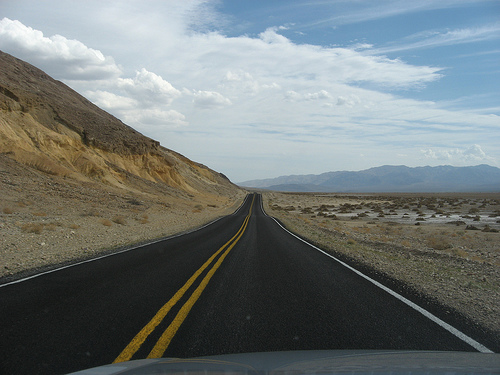Sun & Symantec: A New Breed of Sustainability Leadership?

The passage of the Waxman Markey Bill through the US House of Representatives Energy and Commerce Committee this week has left behind it some hard feelings and a split in the business lobby. The US Chamber of Commerce came under severe pressure for lobbying against the bill whilst many of its members were pulling the other way.
The main business initiatives in support of regulation are the US Climate Action Partnership (US CAP) and the CERES led Business for Innovative Climate and Energy Policy (BICEP). In contrast, the US Chamber has been an ardent opponent eventhough both coalitions include prominent US Chamber board members such as Nike, Dow Chemical, Duke Energy, Caterpillar and Alcoa. The opprobrium got to such a pitch last month that Johnson & Johnson felt compelled to write to the Chamber CEO Thomas Donohue (original copy here):
We would appreciate if statements made by the Chamber would reflect the full range of views, especially those of Chamber members advocating for congressional action.
Now while US CAP is composed mostly of the usual suspects of energy and heavy industry companies, the BICEP initiative is an altogether more exotic species. BICEP, including Nike, Gap, Sun, Symantec, Timberland, Starbucks, eBay and others, is dedicated to the following objectives:
And why is it that the US Chamber is emboldened to row in the opposite direction of some of its most powerful member expressed interests? When it comes to dissonance in the US Chamber, Marc Gunther, one of America's most respected journalists in the field of business and sustainability, smells a rat:
I have to disagree with Marc here. Sure there is bound to be some level of duplicity going on but, in the main, I think the global business lobby is much more fundamentally and ideologically split. It is divided between those whose world view and business model is fixed to the status quo and those who are ready to go forward to take first mover advantage in the emerging low carbon economy. (There are also plenty sitting on the fence to see how this shakes out before taking a stand.)
Writing in the Harvard Green Advantage Blog, Green to Gold co author Andrew Winston provides one explanation for some of this seemingly irrational behaviour:
More evidence of an ideological split can be seen in Jack Welch's tweets about the World Business Summit on Climate Change underway this weekend in Copenhagen:
And so who exactly are these alarmists attending the business summit repressing the voice of the 'other side' of the climate change issue? Well, errr............Pepsico, Duke Energy, Unilever, BP, SAP, Intel, State Street, Vattenfall .. and so on. Hardly the loony fringe and a tad difficult to dismiss in the way Welch would like us to.
Need more evidence of an ideological divide within the business community? Then how about this? On Friday last the Wall Street Journal wheeled out no less than Bjorn Lomborg to pen an Op Ed entitled 'The Climate Industrial Complex'. (Important to note that Lomborg, a Danish academic with no training in climatology, was censured by the Danish Committee on Scientific Dishonesty (DSDC) after the publication of his treatise, 'The Skeptical Environmentalist'. To be fair, the DSDC's ruling & the process undertaken has been the subject of bitter debate for years now from all quarters. One thing is clear though, Lomborg's thesis is in serious question and he is a deeply polarizing figure. ) In the WSJ piece Lomborg pours scorn on companies looking to benefit from the transitional process to a low carbon economy:
The world's largest wind-turbine manufacturer, Copenhagen Climate Council member Vestas, urges governments to invest heavily in the wind market. It sponsors CNN's "Climate in Peril" segment, increasing support for policies that would increase Vestas's earnings........American electricity utility Duke Energy, a member of the Copenhagen Climate Council, has long promoted a U.S. cap-and-trade scheme. Yet the company bitterly opposed the Warner-Lieberman bill in the U.S. Senate that would have created such a scheme because it did not include European-style handouts to coal companies. The Waxman-Markey bill in the House of Representatives promises to bring back the free lunch.
Well fancy that, businesses lobbying the government for their own selfish interest? Hardly. Now Lomborg has a fair point, some will inevitably be out to game the process, but surely its the end result that matters more than the political process marred by compromise. There will be runners and riders, winners and losers. Should we think ill of Vestas for their ambition to be a player in wind energy plant? Should we dismiss Duke Energy if they lobby for concessions on permit trading even if they accept and support an emissions cap? Lomborg is a divisive character and there are plenty who think he was deliberately done in by his academic brethern. Regardless, for the Wall Street Journal to publish his conspiratorial ideas of a 'climate industrial complex' in the interregnum period after the passage of the Waxman/Markey Bill through its first committee hearings and before the World Business Summit on Climate Change is just another sign of the bitter divisions.
The current snafu at the Chamber is not the first time a business lobby has been split over differences of opinion on environmental issues. The UK equivalent, the Confederation of British Industry (CBI), recently had its positive stance on the expansion of Heathrow airport challenged when Kingfisher, Carphone Warehouse, Credit Suisse, J Sainsbury & Rupert Murdoch's News Corp similarly all broke ranks. Which brings me back to my earlier question: why do Sun & Symantec back the anti coal provisions of BICEP when it is of little significance to their immediate business model? For that matter, why is Rupert Murdoch worried about expansion at Heathtrow? What does Sainsbury's CEO Justin King mean exactly by his idea of 'responsible citizenship'?
The laissez faire set may bridle at this but in these times it is proving both, possible and necessary, to take the invisible hand out from behind the veil and steer our economic base to safer shores. It is possible for the business community to act, truly as if a community, to rebuild the structures of the global economy. This means looking not only to, but also far beyond, the pursuit of a few incremental stimulus dollars, towards building a whole new economic future. These new leaders are capable of working confidently with policy makers to charter a fairer economic system in preference to surrendering our destiny to be determined alone by market forces. This is what may just explain the recent actions of Sun or Symantec or J Sainsbury and represent the green shoots of a new type of corporate sustainability leadership. Such leaders believe we can reset our economy, not because we reject market ideology, but precisely because we so faithfully believe in the innovative power of the markets to help get us where we need to be.
We may well already have entered a post globalization era where, no longer paralyzed by an inevitability of a race to the bottom and in full recognition of our global & sectoral economic interdependence, a new breed of leaders can finally emerge. To really make a difference, Silicon Valley needs to do much more to pick up the modest gauntlet thrown down by Symantec & Sun as outriders on climate change policy. Oracle has done well to find itself in a position to inherit the sustainability leadership instincts of the latter.
UPDATE
Jack Welch provided almost immediate feedback on twitter. I'd like to interpret his comments as full agreement but, at the very least, we can be sure he is gracious and a good sport. Thanks Jack.
